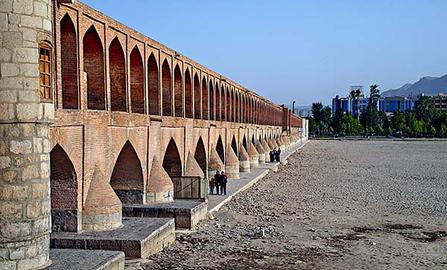
“The town is deserted. Anybody who musters up enough courage to leave home can see that Isfahan is no longer the way it was,” says Zahra, a young woman who lives in Isfahan, where at least eight women have been the victims of acid attacks in recent weeks. One woman died after acid was thrown in her face. Zahra says many people do not dare to leave the house after dark. “I don’t leave home unless I have to,” she says.
A 28-year-old woman named Haleh says that since the acid attacks began, her life has ground to a halt. “It’s almost 15 days since I last left home,” she says. “I’m not attending any of my classes and if I do leave home, I keep the windows of my car closed at all times.” She says all the women she knows are doing the same.
Neda also lives in Isfahan. “Nobody knows what’s going on,” she says. “It’s not yet clear whether only one person is responsible for the crimes, or if it’s more than one.” Neda follows the Iranian media to get updates on the attacks and what authorities are doing to find out who is responsible. She does not trust foreign media and social network sites, saying that they do not report the full, true story. Their reports are full of rumors, she says.
Over the last few days, authorities have failed to give a satisfactory update on investigations into the attacks — for the most part, they have remained silent on the matter. The most recent comment came from Naghavi Hosseini, spokesman for the parliament’s National Security Commission, who announced: “the perpetrator is mentally disturbed.” While this may not come as a surprise to Isfahan residents, it is also confusing: is one person responsible, or is it a group of vigilantes? It also contradicts previous statements by authorities, which have been quick to blame Western and Israeli intelligence agencies for the attacks.
Neda has been disappointed with the Iranian media too. “Unfortunately, they don’t provide me with enough information to help me decide whether, after two weeks, I can leave the house or not. Reports only say that the criminals will be punished to the limit of the law, and that some suspects have been arrested. In other words, they don’t actually say for sure whether the culprit or culprits have been arrested.”
Isfahan’s Friday Prayer Leader announced on Friday that apprehending the criminal responsible for the attacks was a “religious duty,” adding that the person or persons would be appropriately punished. The governor of Isfahan reported that 10 investigative teams had been deployed and that dozens of suspects had been arrested. But, he said, “It’s possible that the assailant has left Isfahan.” He too referred to the mental perpetrator’s mental health, saying that he “could be” mentally deranged.
Blame the Media
Since news of the acid attacks hit the headlines both inside and outside of Iran authorities have been quick to arrest journalists reporting events, accusing the media of spreading widespread panic across the country.
Maedeh, a 35-year old architect who has lived in Isfahan since she was a child, says that she would prefer to die than have acid thrown in her face. Like many other women in Isfahan, she has not left home since news of the attacks broke. “A few years ago there were rumors that a serial killer was prowling the streets of Isfahan, but I wasn’t frightened like I am now,” she says. “I went about my daily life calmly and the city moved along as normal. But the acid attacks are not something I can ignore easily. Even when I’m in the car I’m afraid. I tell myself that if a murderer gets hold of me, the situation is clear-cut: I’ll be killed with a knife or a bullet. But I can’t even imagine what it would be like to live with an injury caused by an acid attack. I truly would prefer death.” Maedeh says she will only end her self-imposed confinement when she is certain the acid thrower or throwers are arrested.
But many Isfahani women have continued their normal routines despite the attacks. Mehri Najaf-Abadi, an architect working for an interior design firm, tells IranWire she took a leave of absence for two days but after that returned following her husband’s advice. “My husband said they’re sensitive to how women are wearing the hejab so I decided to wear the chador so that maybe...”. Her voice trails off. “Wearing the chador is difficult but it’s better than having my face burned. In our company women aren’t wearing makeup anymore and several others are wearing the chador like me.”
Arezoo Ladouni, who works at a dressmaking workshop, continued going to work when news of the acid attacks broke. “I was very frightened and didn’t know how I’d get to work,” she says. “First I thought I’d buy a veil and cover my face but then I noticed my brother’s motorbike helmet so I decided to wear one. “They’re really heavy,” she explains, “but for the moment I have to wear it because otherwise I’d be terrified when I walk the streets.”
Sahar Khoda-Bakhshi, who works for a civil engineering firm, now wears a veil as she believes the acid attacks are connected to the hejab. “What’s really upsetting is that our male colleagues laugh at us all the time.” Now when she arrives at the office, she takes off her veil in the elevator and puts it back on when she leaves in the afternoon. “Our coworkers keep using the words ‘veil’ or ‘burqa’. For example when they are ask me for a file they’ll say it with a smirk, ‘will you pass me the veil...oh, sorry, I meant the file.’” Despite this, she continues to cover herself. “I want to keep my face,” she says.
Azita Vafadar works for a phone-subscription company in Isfahan and has also been ridiculed. “At the moment our male colleagues are constantly joking about the acid attacks,” she says. “For example if I’m pouring tea for myself one of them will say ‘can I have one too?’ and if I say ‘no’ they’ll laugh and say ‘if you don’t I’ll throw acid on you’. Believe it or not, when I hear that I have a panic attack.”
Atefeh lives in Isfahan and forbids her daughter Maryam from leaving the house. “I know my daughter is brave enough to go out but I won’t let her,” she says. Maryam says, “The town is more deserted than it was before. They say that officers dressed in normal clothes have the city under control but it might give us more confidence if they were in uniform. It might be though that they can identify the culprit more easily if they’re not recognizable.” Like many women living in Isfahan, Maryam does not know if the perpetrator has been caught.
Atefeh says that men are suffering under the circumstances as well. “Yes, women are the main targets but do you really think men can sleep at night when they’re kept up worrying about what’ll happen to their wives, daughters and sisters?”
visit the accountability section
In this section of Iran Wire, you can contact the officials and launch your campaign for various problems






















comments